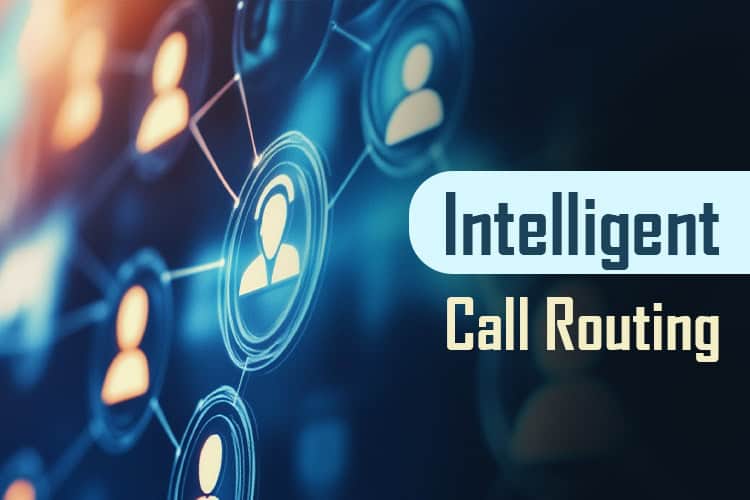The current, often hectic environment in call centers is due to them trying to handle a large number of customer interactions while maintaining high service quality. One highly effective method to simplify this process is Intelligent Call Routing (ICR). This technology, powered by AI, changes the way incoming calls are managed, making sure that customers are swiftly directed to the right agent or department.
In this article, we will discuss what intelligent call routing is, how it operates, its advantages and disadvantages, and best practices to enhance its effectiveness in contact centers.
What Is Intelligent Call Routing?
Intelligent Call Routing (ICR) is an advanced technology that uses artificial intelligence to direct incoming calls to the most appropriate agent or department. Unlike traditional routing methods that rely on a simple sequential approach, ICR examines various caller information—such as call history, customer profile, and the context of the interaction—before identifying the best match for the call. This approach enhances the overall customer experience by minimizing wait times and increasing the chances of resolving issues during the first call.
NobelBiz, a leader in contact center technology, provides advanced ICR solutions that assist businesses in enhancing their customer service operations. By using AI and machine learning, NobelBiz’s intelligent routing systems guarantee that each customer interaction is managed by the most suitable agent, leading to greater satisfaction and improved efficiency.
“At NobelBiz, our intelligent call routing solutions are designed to connect customers with the right agent at the right time, ensuring a seamless and personalized experience with every interaction.” – Christian Montes Executive Vice President Client Operations
How Intelligent Routing Works
Understanding how Intelligent Call Routing functions requires a closer look at the underlying technologies that power it. Here’s a breakdown of the key components:
Data Collection
The initial phase of intelligent call routing involves data gathering. This process includes collecting details about the caller, such as their phone number, previous interactions, account standing, and the purpose of their call. This information can be obtained from Customer Relationship Management (CRM) systems, Interactive Voice Response (IVR) systems, and even real-time data from live calls.
Data Analysis
After the data has been gathered, the intelligent routing system conducts an analysis to recognize patterns and make educated choices. This analysis involves assessing the urgency of the call, the customer’s preferences, and the availability of agents who have the necessary skills to address the issue. Sophisticated algorithms quickly process this information, assisting real-time routing decisions.
Routing Strategy and Connection
Once the data has been analyzed, the system employs a routing strategy that aligns the caller with the most suitable agent. This selection can depend on several factors, including the agent’s expertise, current workload, and historical performance. When the optimal match is identified, the call is promptly connected to the chosen agent or department.
NobelBiz’s Intelligent Call Routing solutions are designed to smoothly integrate with current contact center frameworks, providing customizable routing strategies personalized to particular business requirements. Whether you need skill-based routing, geographic routing, or time-based routing, NobelBiz guarantees that your calls are consistently directed appropriately.
Intelligent Call Routing Pros and Cons
Pros and Cons for Contact Centers
Pros:
- Enhanced Efficiency: ICR reduces the time agents spend on calls by ensuring they handle inquiries within their expertise, leading to higher productivity.
- Cost Savings: By optimizing resource allocation, contact centers can manage more calls with fewer agents, reducing operational costs.
- Scalability: ICR systems can easily scale to accommodate growing call volumes, making them ideal for expanding businesses.
Cons:
- Initial Setup Costs: Implementing an intelligent routing system may require a significant upfront investment in technology and training.
- Complexity: The advanced algorithms and data integrations necessary for ICR can be complex to manage, requiring skilled IT support.
Pros and Cons for Call Center Agents
Pros:
- Job Satisfaction: Agents are more likely to handle calls within their expertise, leading to a more fulfilling work experience.
- Better Performance Metrics: By focusing on their strengths, agents can improve key performance indicators (KPIs) like first-call resolution rates and customer satisfaction scores.
Cons:
- Limited Flexibility: Agents may have fewer opportunities to diversify their skills if they are constantly routed calls in their area of expertise.
- Pressure to Perform: With intelligent routing, agents may feel increased pressure to resolve issues quickly, especially if their performance is closely monitored.
Pros and Cons for Customers
Pros:
- Faster Resolutions: Customers are more likely to have their issues resolved on the first call, reducing the need for callbacks or escalations.
- Personalized Experience: ICR systems can offer a more personalized customer experience by connecting callers with agents who understand their specific needs.
Cons:
- Potential for Misrouting: Despite advanced algorithms, there is always a small risk that a call may be misrouted, leading to frustration for the customer.
- Dependence on Technology: In cases where the ICR system fails, customers may experience longer wait times or be directed to the wrong department.
Brayan Carpio
‘The technology aspect of NobelBiz stood out compared to the competition, and also the great team! All the way from onboarding to support to troubleshooting has been great throughout this journey!’
Best Practices for Intelligent Call Routing
Integrate with the Right IVR System
To ensure effective intelligent call routing, it is critical to integrate with a strong IVR system. IVR systems gather important information from callers before they are directed, acting as the initial contact point in the routing process. An effectively designed IVR system can greatly improve the accuracy of call routing by efficiently collecting and handling caller input.
Use Advanced Reporting and Analytics
To enhance the performance of your intelligent routing system over time, it’s important to employ advanced reporting and analytics tools. These tools offer insights into call trends, agent performance, and customer satisfaction, which can help you refine your routing strategies. NobelBiz’s solutions include detailed analytics features, allowing contact centers to make knowledgeable, data-driven choices.
Assess and Assign Agent Strengths, Skills, and Expertise
A critical element of successful intelligent call routing is understanding the strengths and skills of your agents. It is important to regularly assess and categorize agents based on their areas of expertise, then adjust the routing algorithms accordingly. This practice guarantees that calls are directed to the most qualified agent, finally resulting in better outcomes for customers.
Get More Customers with Intelligent Routing
Intelligent Call Routing represents a revolutionary technology for contact centers, providing various advantages for businesses, agents, and customers. By using AI and data-driven approaches, contact centers can boost efficiency, lower costs, and deliver a more personalized customer experience. NobelBiz’s intelligent routing solutions lead the way in this innovation, offering customizable, scalable, and effective tools to keep businesses competitive in a swiftly changing environment.
For contact centers aiming to optimize their call management processes, intelligent call routing is essential rather than optional. Discover how NobelBiz can assist you in implementing this advanced technology and revolutionizing your customer service operations.

Michael McGuire is a contact center industry expert with almost two decades of experience in the space. His experience includes roles as Director of Contact Center Digital Transformation at NobelBiz, and as Director of Operations at FLS Connect, managing multiple call centers. As President of Anomaly Squared and Targeted Metrics, Michael successfully transitioned companies into remote operations and significantly boosted revenues. With a strong background in customer service, leadership, strategic planning, and operations management, Michael excels in driving growth and innovation in the call center space.
Mike is also a proud Board Member for R.E.A.C.H Trade Group, promoting consumer protection and satisfaction and Co-host of the Off Skripted Podcast – a show about Life, Call Centers and everything in between.







